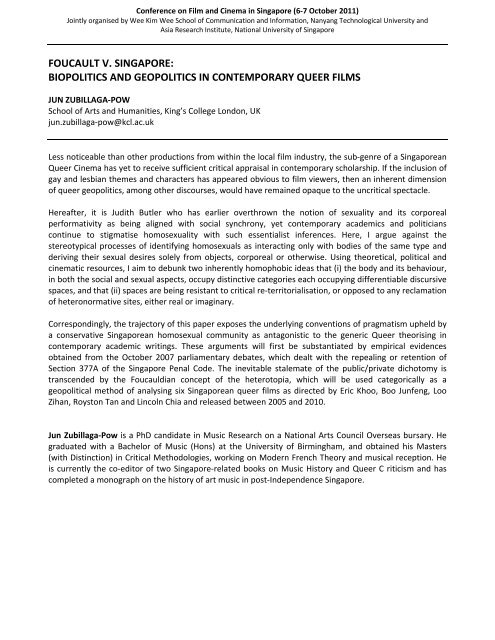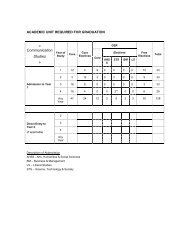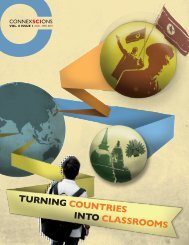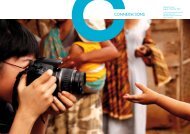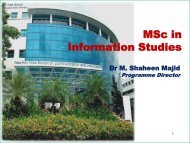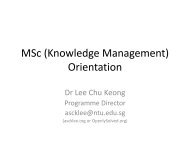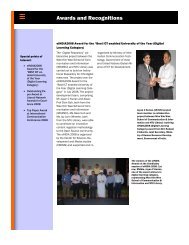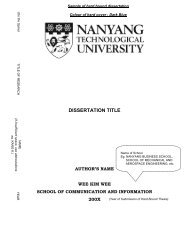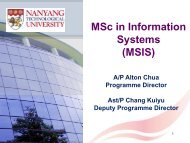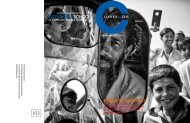Programme and Abstracts 4 Oct 2011 - WKWSCI Home - Nanyang ...
Programme and Abstracts 4 Oct 2011 - WKWSCI Home - Nanyang ...
Programme and Abstracts 4 Oct 2011 - WKWSCI Home - Nanyang ...
Create successful ePaper yourself
Turn your PDF publications into a flip-book with our unique Google optimized e-Paper software.
Conference on Film <strong>and</strong> Cinema in Singapore (6‐7 <strong>Oct</strong>ober <strong>2011</strong>)<br />
Jointly organised by Wee Kim Wee School of Communication <strong>and</strong> Information, <strong>Nanyang</strong> Technological University <strong>and</strong><br />
Asia Research Institute, National University of Singapore<br />
FOUCAULT V. SINGAPORE:<br />
BIOPOLITICS AND GEOPOLITICS IN CONTEMPORARY QUEER FILMS<br />
JUN ZUBILLAGA‐POW<br />
School of Arts <strong>and</strong> Humanities, King’s College London, UK<br />
jun.zubillaga‐pow@kcl.ac.uk<br />
Less noticeable than other productions from within the local film industry, the sub‐genre of a Singaporean<br />
Queer Cinema has yet to receive sufficient critical appraisal in contemporary scholarship. If the inclusion of<br />
gay <strong>and</strong> lesbian themes <strong>and</strong> characters has appeared obvious to film viewers, then an inherent dimension<br />
of queer geopolitics, among other discourses, would have remained opaque to the uncritical spectacle.<br />
Hereafter, it is Judith Butler who has earlier overthrown the notion of sexuality <strong>and</strong> its corporeal<br />
performativity as being aligned with social synchrony, yet contemporary academics <strong>and</strong> politicians<br />
continue to stigmatise homosexuality with such essentialist inferences. Here, I argue against the<br />
stereotypical processes of identifying homosexuals as interacting only with bodies of the same type <strong>and</strong><br />
deriving their sexual desires solely from objects, corporeal or otherwise. Using theoretical, political <strong>and</strong><br />
cinematic resources, I aim to debunk two inherently homophobic ideas that (i) the body <strong>and</strong> its behaviour,<br />
in both the social <strong>and</strong> sexual aspects, occupy distinctive categories each occupying differentiable discursive<br />
spaces, <strong>and</strong> that (ii) spaces are being resistant to critical re‐territorialisation, or opposed to any reclamation<br />
of heteronormative sites, either real or imaginary.<br />
Correspondingly, the trajectory of this paper exposes the underlying conventions of pragmatism upheld by<br />
a conservative Singaporean homosexual community as antagonistic to the generic Queer theorising in<br />
contemporary academic writings. These arguments will first be substantiated by empirical evidences<br />
obtained from the <strong>Oct</strong>ober 2007 parliamentary debates, which dealt with the repealing or retention of<br />
Section 377A of the Singapore Penal Code. The inevitable stalemate of the public/private dichotomy is<br />
transcended by the Foucauldian concept of the heterotopia, which will be used categorically as a<br />
geopolitical method of analysing six Singaporean queer films as directed by Eric Khoo, Boo Junfeng, Loo<br />
Zihan, Royston Tan <strong>and</strong> Lincoln Chia <strong>and</strong> released between 2005 <strong>and</strong> 2010.<br />
Jun Zubillaga‐Pow is a PhD c<strong>and</strong>idate in Music Research on a National Arts Council Overseas bursary. He<br />
graduated with a Bachelor of Music (Hons) at the University of Birmingham, <strong>and</strong> obtained his Masters<br />
(with Distinction) in Critical Methodologies, working on Modern French Theory <strong>and</strong> musical reception. He<br />
is currently the co‐editor of two Singapore‐related books on Music History <strong>and</strong> Queer C riticism <strong>and</strong> has<br />
completed a monograph on the history of art music in post‐Independence Singapore.


